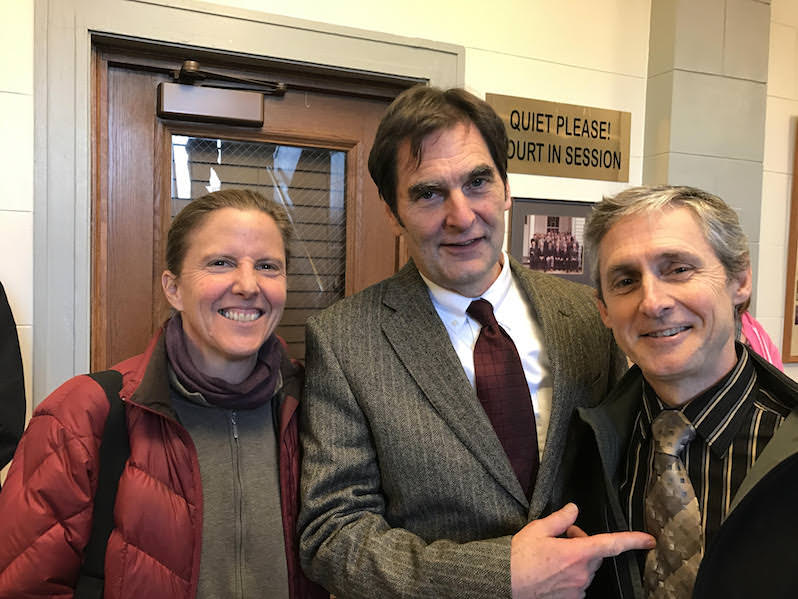Pipeline Valve-Turners Fight for Peaceful Disobedience
Ken Ward shut off a pipeline in Washington state last year to protest a government "unresponsive" to climate change Now he and others face imprisonment .
From left, Emily Johnston, Ken Ward and Michael Foster, three of five activists facing prison time for closing emergency valves on pipelines. (Courtesy of Shut It Down—Climate Direct Action)
In the face of climate change, some activists are willing to go to prison if it means disrupting the political system.
On Wednesday, a jury in Skagit County, Wash., failed to convict Ken Ward, the first protester to be tried for a shutting off a pipeline, after days of being presented with evidence of climate change and arguments that Ward’s disruptive action was necessary.
“I spent 30-some-odd years following only legal approaches,” Ward told Reuters. “It’s only been in recent years that the scale of the problem and lack of a political solution leaves no choice but direct action.”
Breaking in at a Trans Mountain pipeline facility in 2016, Ward activated an emergency shut-off valve, temporarily stymieing the import of Canadian tar sands oil to Washington state. He acted alongside five #ShutItDown valve-turners (now awaiting trial) and three videographers (two of whom no longer face charges) who targeted pipelines in several states on Oct. 11 in solidarity with protesters at the Standing Rock Indian Reservation demonstrating against the Dakota Access pipeline.
Now the activists are being taken to court over their nonviolent actions, which they believe were necessary in the face of acute threats to the climate from the use of carbon-rich fossil fuels.
“We conducted our actions responsibly and openly, calling the pipeline companies in advance to ensure safety, and live-streaming our actions on Facebook,” wrote fellow activist Annette Klapstein, who turned off the Enbridge pipeline in Minnesota. “But our political system is utterly unresponsive to the grave threat to our existence which climate change represents, so it is up to us to stop the fossil fuel industry from continuing to conduct business as usual.”
Companies behind the affected pipelines denounced the demonstrations as hazardous to the protesters and the environment. “Their actions invite environmental incident & create a safety risk,” energy company Enbridge tweeted.
Ward, a former deputy director of Greenpeace USA, president of the National Environmental Law Center and co-founder of Green Corps, was charged with burglary, criminal trespass and sabotage, though prosecutors later dropped the trespass charge. He faced up to 30 years in prison and fines up to $21,000. He and the other valve-turners, as well as those who filmed the events, pleaded not guilty in hopes of paving the way for other activists to have the right to engage in peaceful actions. They admit to trespassing—Ward’s defense showed the jury the video of him turning the emergency valve—but are questioning whether their actions warrant their being labeled as criminals.
In the first days of Ward’s trial, Skagit County Superior Court Judge Michael Rickert—who has a reputation as a progressive jurist—threw out Ward’s necessity defense and disallowed “controversial” scientific evidence that supported the defense’s claim that Ward’s civil disobedience was necessary.
“I don’t know what everybody’s beliefs are on [climate change], but I know that there’s tremendous controversy over […] whether it even exists,” Rickert told the courtroom, according to The Guardian. “And even if people believe that it does or it doesn’t, the extent of what we’re doing to ourselves and our climate and our planet, there’s great controversy over that.”
Rickert explained why he considered a necessity defense inappropriate: It would require “some immediacy, some imminence, more so than this particular threat and harm, which is climatic change, global warming, whatever,” Rickert said. “The actual harm to be avoided is not avoided at all. All that happens is a valve is turned.”
But several days later, the judge allowed climate-change data to be presented to the jury, including a map projecting rising sea levels on the Skagit County coast.
Nevertheless, Ward and his team said they were stunned by Rickert’s stance on climate change.
“I did find it utterly surprising that any judge at this point would imply that the science of climate change is in controversy,” Ward told Truthdig. “The state recognizes climate change and recognizes human contribution to it.”
“Our upcoming trials will be landmark test cases for direct action and the climate justice movement at a time when they’re more important and more vulnerable than ever,” Klapstein wrote. “The trials will deliberate the legality of direct climate action, even as the government crackdown against it intensifies.”
Several states have taken steps to criminalize protests involving civil disobedience, after prolonged #NoDAPL and Black Lives Matter protests and the recent Women’s March on Washington. In Washington state, Republicans have introduced a bill that would classify “economic terrorism” protests as felony civil disobedience.
“The trial is about more than whether Ken broke the law in closing the valve—those facts aren’t in dispute,” Stephen Kent, a spokesman for Ward, wrote in an email to Truthdig. “It’s important because it’s climate action and climate inaction themselves that are really on trial.”
“We should be seizing these kinds of opportunities to do the right thing,” Ward said.
In the wake of Wednesday’s hung jury, prosecutors will consider whether to retry the case.
Updates on the valve-turners’ trials can be found on the Shut It Down—Climate Direct Action Facebook page.
—Posted by KiMi Robinson
With an uncertain future and a new administration casting doubt on press freedoms, the danger is clear: The truth is at risk.
Now is the time to give. Your tax-deductible support allows us to dig deeper, delivering fearless investigative reporting and analysis that exposes what’s really happening — without compromise.
Stand with our courageous journalists. Donate today to protect a free press, uphold democracy and unearth untold stories.









You need to be a supporter to comment.
There are currently no responses to this article.
Be the first to respond.